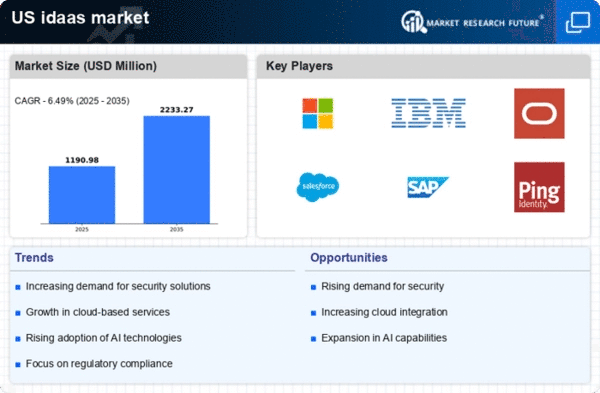Growing Regulatory Requirements
The evolving regulatory landscape in the US is a significant driver for the idaas market. Organizations are increasingly required to comply with various regulations, such as the GDPR and CCPA, which mandate stringent data protection measures. This compliance pressure is pushing businesses to adopt IDaaS solutions that facilitate secure identity management and data governance. In 2025, it is projected that compliance-related expenditures will reach $5 billion, underscoring the financial implications of regulatory adherence. As companies seek to avoid penalties and reputational damage, the demand for IDaaS solutions is likely to rise, further propelling the growth of the idaas market.
Increased Cybersecurity Threats
The rise in cybersecurity threats is a critical factor influencing the idaas market. With data breaches and identity theft becoming more prevalent, organizations are compelled to invest in robust identity management solutions. In 2025, it is estimated that cybercrime will cost businesses over $10 trillion annually, highlighting the urgent need for effective security measures. IDaaS solutions offer advanced authentication and access control features that help mitigate these risks. As companies strive to protect sensitive information, the idaas market is expected to expand, driven by the necessity for enhanced security protocols and compliance with industry regulations.
Emergence of Remote Work Culture
The rise of remote work culture is reshaping the landscape of the idaas market. As organizations adapt to flexible work arrangements, the demand for secure identity management solutions has surged. Companies require IDaaS solutions that enable secure access to corporate resources from various locations. In 2025, it is estimated that remote work will account for 30% of the US workforce, further emphasizing the need for effective identity management. This shift is likely to drive the growth of the idaas market, as businesses seek to implement solutions that ensure security and compliance in a distributed work environment.
Rising Demand for Cloud Solutions
The increasing adoption of cloud-based solutions is a primary driver for the idaas market. Organizations in the US are transitioning to cloud environments to enhance operational efficiency and reduce costs. According to recent data, the cloud services market is projected to grow at a CAGR of 15% through 2026. This shift is prompting businesses to seek identity as a service (IDaaS) solutions that can seamlessly integrate with their cloud infrastructure. As companies prioritize scalability and flexibility, the idaas market is likely to experience significant growth. Furthermore, the demand for remote access solutions is also contributing to this trend, as organizations require secure identity management systems to support a distributed workforce.
Shift Towards Digital Transformation
The ongoing digital transformation across industries is a pivotal driver for the idaas market. Organizations are increasingly leveraging digital technologies to enhance customer experiences and streamline operations. This transformation necessitates the implementation of secure identity management solutions to support various digital initiatives. In 2025, it is anticipated that digital transformation investments will exceed $2 trillion in the US, creating a substantial market for IDaaS providers. As businesses prioritize agility and innovation, the idaas market is expected to flourish, driven by the need for seamless integration of identity services into digital platforms.

















